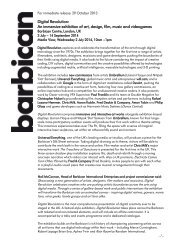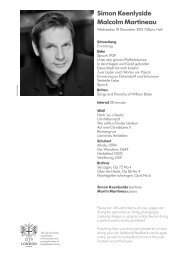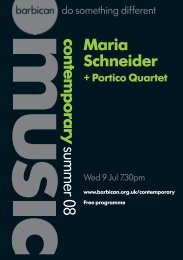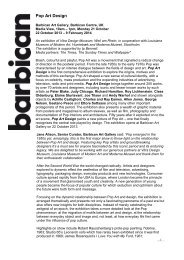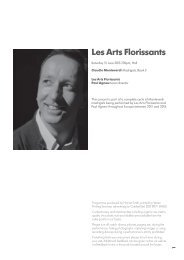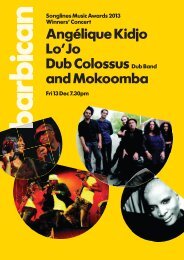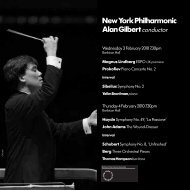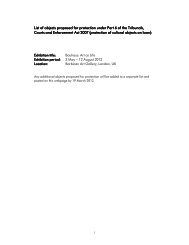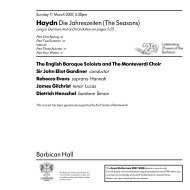Create successful ePaper yourself
Turn your PDF publications into a flip-book with our unique Google optimized e-Paper software.
contradicted by complex fugal counterpoint. <strong>The</strong><br />
final movement is extended and lyrical, pushing<br />
beyond the seeming restrictions of another<br />
opening ostinato and giving way to instinctive,<br />
joyous solos and a final choral flourish.<br />
Auden’s professional influence on <strong>Britten</strong> was as<br />
brief as it was intense, but provoked some of the<br />
composer’s most creative musical responses. A<br />
Shepherd’s Carol (1944) is another example – an<br />
extraordinary, inscrutable piece, and one of the<br />
only remaining clues to a major work that might<br />
have been. While based in America during<br />
the war, Auden started work on the text of his<br />
Christmas Oratorio, intending that <strong>Britten</strong> should<br />
set it. In the end though, only two extracts made<br />
it into music, including this Shepherd’s Carol.<br />
Advised by Auden that it should be treated<br />
either as ‘jazz or folk-song’, <strong>Britten</strong> chose the<br />
latter. A traditional structure of solo verses and<br />
refrain however becomes something rather<br />
unexpected. <strong>The</strong> music of each unaccompanied<br />
verse finds a different melodic way to arrive<br />
back at the chorus, reframing and casting doubt<br />
on its sugary certainty (the affectation of ‘O lift<br />
your little pinkie’ is echoed in <strong>Britten</strong>’s cloying,<br />
quasi-folk harmonies and smug Lombardic<br />
rhythms). Auden’s poetry is associative and<br />
bizarre, provoking contrasting responses from<br />
each of the four soloists that range from codopera<br />
(tenor) to a forthright, popular-style song<br />
from the alto. Withdrawing the piece after<br />
its first performance, perhaps <strong>Britten</strong> himself<br />
felt uneasy over his strange stylistic collage,<br />
that nevertheless offers a characteristically<br />
original take on the Christmas carol.<br />
Treble voices have a particular significance for<br />
a composer who always wished himself back at<br />
the age of 13. Innocence remains tantalisingly out<br />
of reach in the operas – corrupted in <strong>The</strong> Turn<br />
of the Screw, untouchable in Death in Venice,<br />
tragically betrayed in Billy Budd – but enjoys a<br />
much less complicated relationship with <strong>Britten</strong>’s<br />
choral writing. Friday Afternoons (from which<br />
A New Year Carol comes) is a cycle of unison<br />
songs for upper voices originally composed for<br />
<strong>Britten</strong>’s schoolmaster brother and his school<br />
choir. Although nothing could be simpler than the<br />
melodies, <strong>Britten</strong> manages to insert his distinctive<br />
musical voice into piano accompaniments that<br />
subvert as often as they support. Here, in a<br />
carol based on the pagan New Year custom for<br />
children to sprinkle passers-by with water from a<br />
well, <strong>Britten</strong> sets the lilting melodic explorations<br />
of his voices against anchoring chords in piano<br />
(or harp), giving the whole a folk-innocence and<br />
a true simplicity that couldn’t be further from<br />
the muted cynicism of the Shepherd’s Carol.<br />
<strong>The</strong> Choral Dances from <strong>Britten</strong>’s Elizabeth I<br />
opera Gloriana were adapted by the composer<br />
himself from a sequence in Act 2 in which the<br />
townsfolk of Norwich present a masque for<br />
the visiting queen. <strong>The</strong> six Dances (scored for<br />
choir, harp and a solo tenor who serves as<br />
master of ceremonies) are poised somewhere<br />
between satire and sincerity, pastiche and<br />
pomp. <strong>The</strong>y capture both the performers’<br />
rustic attempts at sophistication (the use purely<br />
of consonant intervals in the Second Dance,<br />
depicting ‘Concord’, feels comically literal) and<br />
their energetic charm (the lively syncopation<br />
of the Fifth Dance or the forthright bell-chime<br />
patterning of the First Dance). <strong>The</strong> set concludes,<br />
however, with a movement that transcends goodhumoured<br />
mockery to deliver a radiant prayer<br />
of praise. No-one imbues C major with more<br />
warmth than <strong>Britten</strong>, and as the canonic waves<br />
of entries ripple over one another in endless<br />
cycles, we find ourselves no longer in England<br />
but suddenly in the Albion of poets’ imagination.<br />
Composed as a silver wedding present for<br />
Leonard and Dorothy Elmhirst (friends and –<br />
crucially – benefactors of <strong>Britten</strong>’s), the Five<br />
Flower Songs are among the most conservative<br />
of all the composer’s choral cycles. That isn’t to<br />
say they lack interest or invention, simply that<br />
the iconoclasm of A Boy Was Born or Christ’s<br />
Nativity has no place here. While many of<br />
<strong>Britten</strong>’s earlier choral works look determinedly<br />
to a musical future, this set from 1950 feels like a<br />
gentle homage to an earlier age, to the pastoral<br />
cycles of Stanford and Parry. It’s an effect only<br />
heightened by the choice of poets – Herrick,<br />
Crabbe, Clare and an anonymous balladeer.<br />
We start briskly, with any undue sentimentality<br />
over Herrick’s fading daffodils dulled by <strong>Britten</strong>’s<br />
matter-of-fact treatment – voices dancing<br />
together in imitative counterpoint that feels<br />
anything but mournful. But both Herrick’s ‘<strong>The</strong><br />
Succession of the Four Sweet Months’ and John<br />
Clare’s ‘<strong>The</strong> Evening Primrose’ indulge their<br />
5 Programme notes




